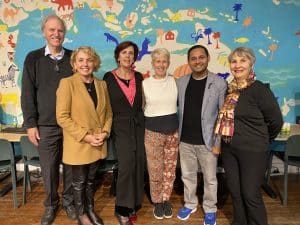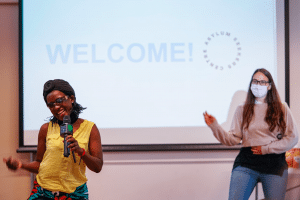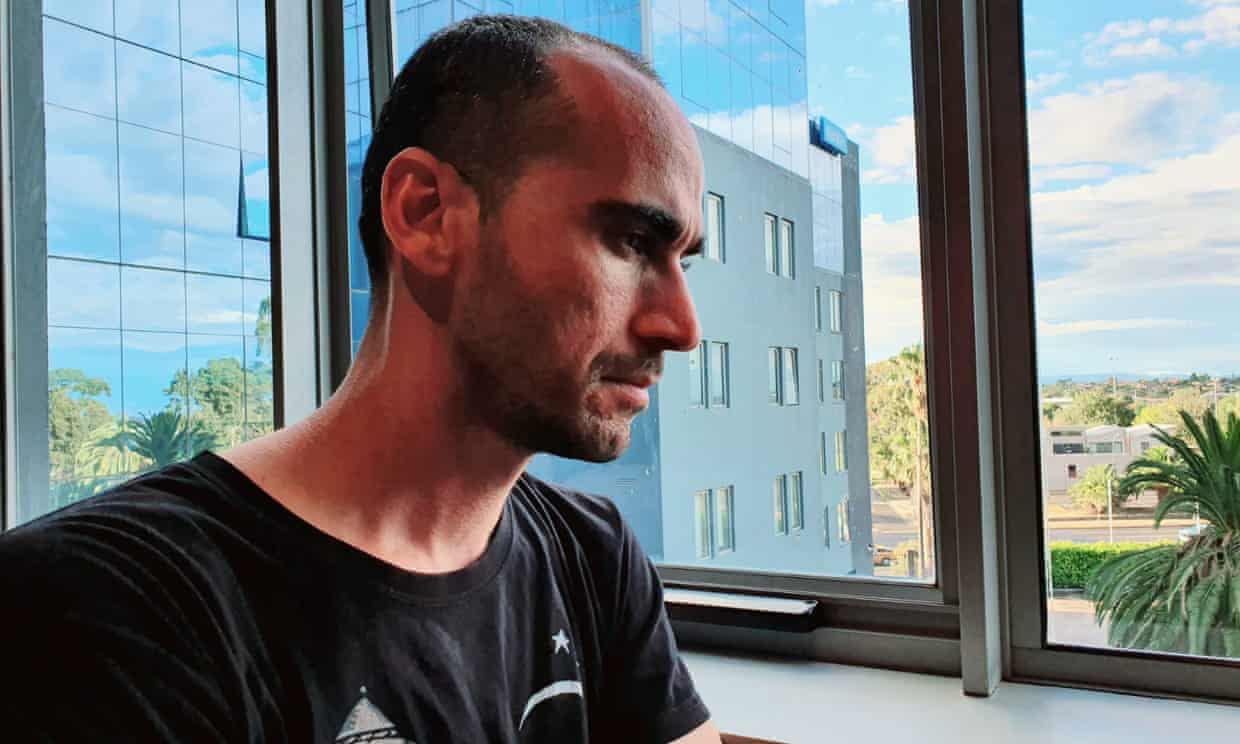Tiny instruments, big hearts with “Sing & Grow”
Tiny instruments, big hearts with “Sing & Grow” Every Thursday morning at the Asylum Seekers Centre in Newtown, our main… Read More
People seeking asylum come to Australia in hopes of leaving their trauma behind, fleeing persecution, violence, abuse, and discrimination. Where they expect to find safety and freedom, Australia’s refugee policies can also add new forms of hurt and fear.
The ASC health team is made up of four nurses, three pro bono GPs and one pro bono physiotherapist. The clinic primarily supports people seeking asylum who are not eligible for Medicare, and they have a collaborative relationship with NSW Health who ensure referral pathways to specialised services with fee waivers. Last year, the clinic held 461 GP appointments and 5402 nurse appointments.
“Nearly everybody coming in to this country has suffered in some way,” says Caroline, a physiotherapist who spent eight years doing pro bono work for the ASC. Caroline has treated people seeking asylum who have experienced poverty, abuse, discrimination, isolation, and fear. Their trauma is significant and often overlooked.
“We hold a lot of our emotional trauma within our body,” Caroline says, “and that can create tension and tightness and pain and dysfunction”. Caroline uses a trauma-based approach to her work, which treats the physical manifestations of trauma whilst still acknowledging the emotional component of the ailment.

The results are often remarkable. “Even giving some of the clients the simplest exercise…completely changes how they function, so they actually improved really, really quickly,” Caroline says. “For many of them it was the first time that they really had any care for their physical injuries.”
When Noel first came to the ASC for support, almost five years ago, she had never done exercises before. The trauma and exhaustion from her experiences caused both physical and emotional ailments. “I was living in the darkest part of my life,” she says. “You can’t open up much. But even my first conversation [with the ASC]..really, really helped me a lot.”

“Caroline is amazing,” says Noel. Her treatment “was very, very important because of the depression and the pain that would run all over my body, and then I couldn’t sit for a long time. Even now, I don’t sit for a long time, but not as much as before.”
However, it is too often that the treatment and conditions upon arrival in Australia only exacerbate and further entrench physical, emotional, and psychological trauma.
“It’s a massive insult,” Caroline says of the Australian detention regime, which so many of her patients have been victims of.
Artist Mostafa “Moz” Azimitabar survived the full cruelty of the detention system. Following six years imprisonment offshore “surrounded by chaos and trauma” on Manus Island, he was forced to spend 15 months in hotels in Melbourne.
He wrote for the Guardian that his hotel room was “an invisible coffin,” where he spent his days staring out through the small opening of his window at a concrete wall, struggling to breathe, dreaming of freedom and sunlight. “Trauma is like having a blade inside of you, but you can’t find where it is,” he says.

Moz sued the Australian Government over his hotel detention, which he alleges was illegal. “I find healing through…fighting for justice,” Moz writes. “It is important to tell the truth about what happened in the prisons.”
The Australian Human Rights Commission launched an investigation into the use of hotels as alternative places of detention (APODs) last year, just recently publishing their findings. From mouldy food and windows that couldn’t fully open, to forced isolation and headcounts in the middle of the night, APODs were found to be places in which human rights abuses are persistent, causing “serious negative mental health impacts, which progressively worsen over time and exacerbate pre-existing trauma experienced by some people being detained”.
Whilst the Federal Court ruled that Moz’s detention was lawful, the judge criticised the “lack of thought, indeed lack of care and humanity, in detaining a person with serious psychiatric and psychological problems in the hotels for 14 months”.
“A lot of [people seeking asylum] are here on their own without their family, without their children, without their parents,” Caroline says, “and they’ve had to escape their own country to be safe. But they’re just desperately in need of their lives around them.”
Even out of detention, people seeking asylum in Australia are faced with years of uncertainty.
“So, so, so painful, the process,” recalls Noel. “You wait, you don’t know the direction, you wait. You want to bring your daughter, you wait… all of those things can torment your brain.”
As a person seeking asylum, whether or not you are entitled to Medicare depends on your visa and visa conditions, which often change throughout the application process. Additionally, only 2% of people seeking asylum have access to any form of financial safety net (in the form of ‘Status Resolution Support Services’), and none have access to the mainstream services others in the community rely on.
As an Irish immigrant to Australia, Caroline’s experience is worlds apart from those of her patients at the ASC. “I had an easy job of getting into this country because I speak the language; I had a profession that I could get into,” she says. “The depth of what they have experienced is usually greater than what most of us Westerners have experienced.”
With the ASC’s support, Noel was able to study at TAFE, and she now has a casual job working in aged care, five days a week. “Me, I was so lucky,” she says. When she meets people at the ASC who are looking for work, like she once was, Noel reaches out to aged care employers: “I call them, I tell them, “Please give these people jobs.
Although Moz says he still feels “trauma’s familiar penetration” when he’s alone, the ability to give back to the community, whether it’s through fighting for change or simply finding a job, is an important step along the pathway towards survival and healing.
The Asylum Seekers Centre health clinic is seeking dedicated healthcare professionals to lend their expertise and time pro bono to make a significant impact on the lives of asylum seekers in need. Offering just three hours a week or fortnight, you can help alleviate physical and emotional hardships faced by people in our community and make a real difference in the lives of those seeking safety. Express interest and request more information here.
Tiny instruments, big hearts with “Sing & Grow” Every Thursday morning at the Asylum Seekers Centre in Newtown, our main… Read More
In the competitive world of catering, Parliament on King combines exceptional cuisine with a powerful social mission. This catering-focused social… Read More
"*" indicates required fields
